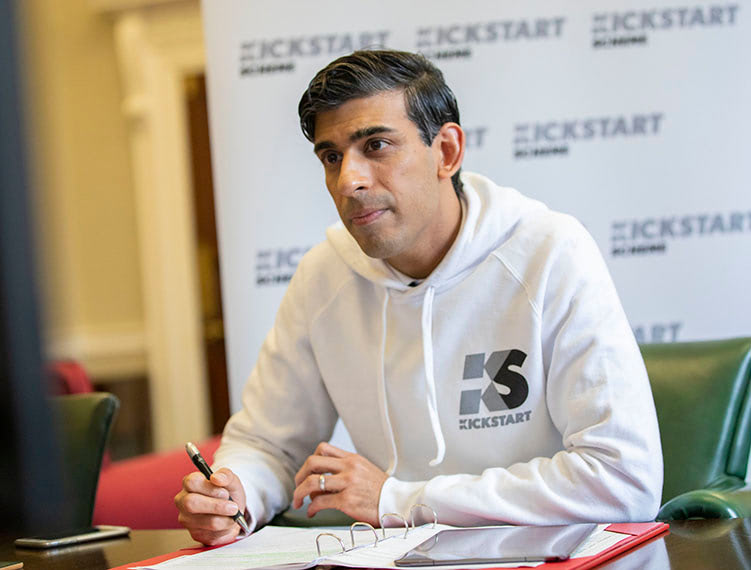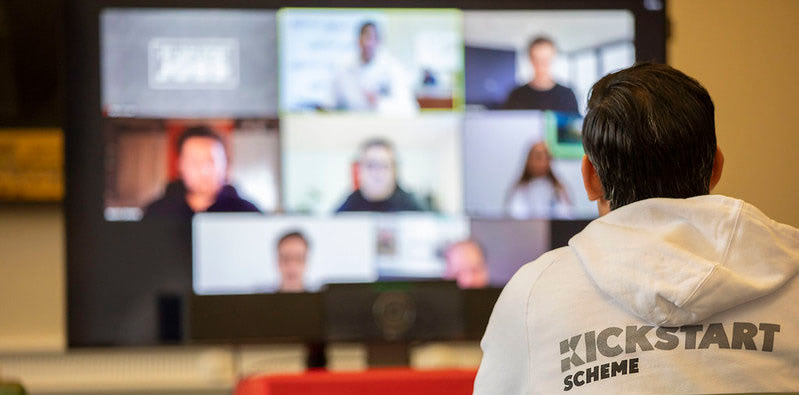Rishi Sunak Exclusive: I want the next generation to be remembered as the Kickstart generation

Ahead of National Apprenticeship Week 2021 next week (8-14 Feb) #NAW2021 #BuildTheFuture, @FENews catch up with Chancellor @RishiSunak to find out more about #PlanforJobs and what the new #Kickstart changes being introduced this week will mean for the wider Skills Landscape, including #Traineeships and #Restart:
Can you explain the difference between Traineeships and Kickstart?
Both schemes are crucial to our Plan for Jobs, and offer different services to suit individual needs.
Kickstart is about helping young people on Universal Credit who are at risk of long-term unemployment [Kickstart participants do not need to have been unemployed for a year].
The scheme offers employers the chance to take on a young person who otherwise might not have got into work and give them experience and training that will improve their chances of going on to find long-term, sustainable work. Each placement is six-months long and is paid for by the government.
A traineeship is a training course for 16-24 year olds that includes a work placement of at least 70 hours, and lasts from 6 weeks up to 1 year – though most traineeships take less than 6 months.
Unlike Kickstart, you do not have to be on Universal Credit (UC). Traineeships concentrate on vocational, English and Maths skills, and are designed to get young people ready for the workplace.
So Kickstart doesn’t become a ‘free placement’ for employers, but is the start of a career for young people, how can employers support Kickstarters and offer progression?

Young people are usually amongst the worst hit by crises, and unemployment can have longstanding implications for their future jobs and wages. We also know people are leaving education into an extremely difficult jobs market. But I don’t want the next generation to be remembered on these terms – I want the next generation to be remembered as the Kickstart generation. It’s their talent and skills that will drive our country forward in the future.
That’s why, as part of the application process, employers are being asked to demonstrate what employability support they will provide for the young person on the scheme to ensure Kickstart participants are able to capitalise on their experience and use it as a stepping stone into work. This may include on-the-job-training, mentoring and work-search support.
It was great to hear last week from employers and gateways, like The Youth Group or LADbible Group, about the mentoring that they provide to their Kickstart participants.
We of course would love to see young people being taken on after their placement, and some employers have already outlined their plans to do this, but for those who don’t immediately continue into full-time, unsubsidised work, support will be available from the young person’s work coach. This includes help refreshing their CV and advice on the type of future roles to apply for.
With the 30 placement cap now removed, hopefully this will encourage more SMEs to be involved. Now companies don’t have to go through a Gateway organisation, how can we help SME’s to assist the Kickstarters?
Working for a small business can be an incredible introduction, or reintroduction, into the world of work. One of my first jobs was in a pharmacy, and I learned so much while I was there.
In fact last week I spoke with Ellen, one of the youngest people to take part in the Kickstart Scheme, who has recently started as a Training Dispensing Assistant at Hollowood Chemists in Manchester. She’ll leave the chemist with two qualifications, and plans to use them to go on and train in the industry – she couldn’t have done that if it wasn’t for her local pharmacy. Brilliant.
I’ve been amazed by the volume of high-quality roles that have already been created by gateways across Great Britain, but it was clear from the feedback we received from some small businesses that they wanted more choice about how they access the scheme – that’s why we removed the threshold of a minimum 30 jobs for direct applications to make it even simpler to get involved.
Of course, that doesn’t mean small businesses can’t get support from a gateway – they can continue to partner with one of over 600 organisations, such a chamber of commerce.
I would encourage any business which requires extra support – either with the application process, or organising the scheme’s employability training – to partner with one of the many great gateway organisations to get that help and ultimately, create the best possible Kickstart experience for the young person.
Restart is a really interesting part of the Plan for Jobs, how can we help the adult unemployed effected by Covid ‘pivot’ into new careers?
You’re right, Restart is a vital component of our Plan for Jobs. Although young people have been front and centre of my mind, of course the pandemic has been a challenge for everyone, and we want to protect as many livelihoods as we can.
So unlike Kickstart, the aim of Restart is to provide intensive and tailored support to people on UC, of any age, who have been unemployed for over 12 months and help them find work.
We’ve put £2.9bn behind it and expect to support over one million people.
However, it is important to remember that Restart is part of a wider landscape of provision that can help people find work and pivot into new careers.
In the Plan for Jobs, to help people move sectors, I announced funding to triple the number of sector-based work academy programme (SWAPs) placements.
SWAPs are short programmes consisting of pre-employment training, work-experience placements and guaranteed job interviews linked to vacancies in sectors with high demand.
Are there plans to enable people who may have been on long term furlough to join Restart, or is the scheme only open to those that have been unemployed for a set period of time?
While referrals will be focused on UC claimants who have been unemployed and searching for work for over 12 months, there will be some additional places available to claimants who work coaches believe would benefit from the support – we call these discretionary referrals.
This could include people who may have been out of work for longer than their UC benefit claim indicates, for example those who were previously furloughed. These discretionary referrals will be made on a case by case basis, following conversations with a work coach.
How do we ensure schemes like Kickstart and Restart do not displace Apprenticeships?
Kickstart and apprenticeships are different programmes. Kickstart is aimed at helping young people, who are at risk of long term unemployment, to boost their job prospects and broaden their horizons so they’re ready for work.
An apprenticeship is a job with occupational and vocational training that ensures apprentices gain the skills they need for their job as well as their future career. Of course, we hope that in some cases, a Kickstart placement may lead to an apprenticeship or a full-time job.
As part of our Plan for Jobs, employers are being offered £2,000 for each new apprentice aged under 25 they hire, and £1,500 for each new apprentice they hire aged 25 and over, up to the 31st March 2021.
Rishi Sunak, Chancellor of the Exchequer










Responses